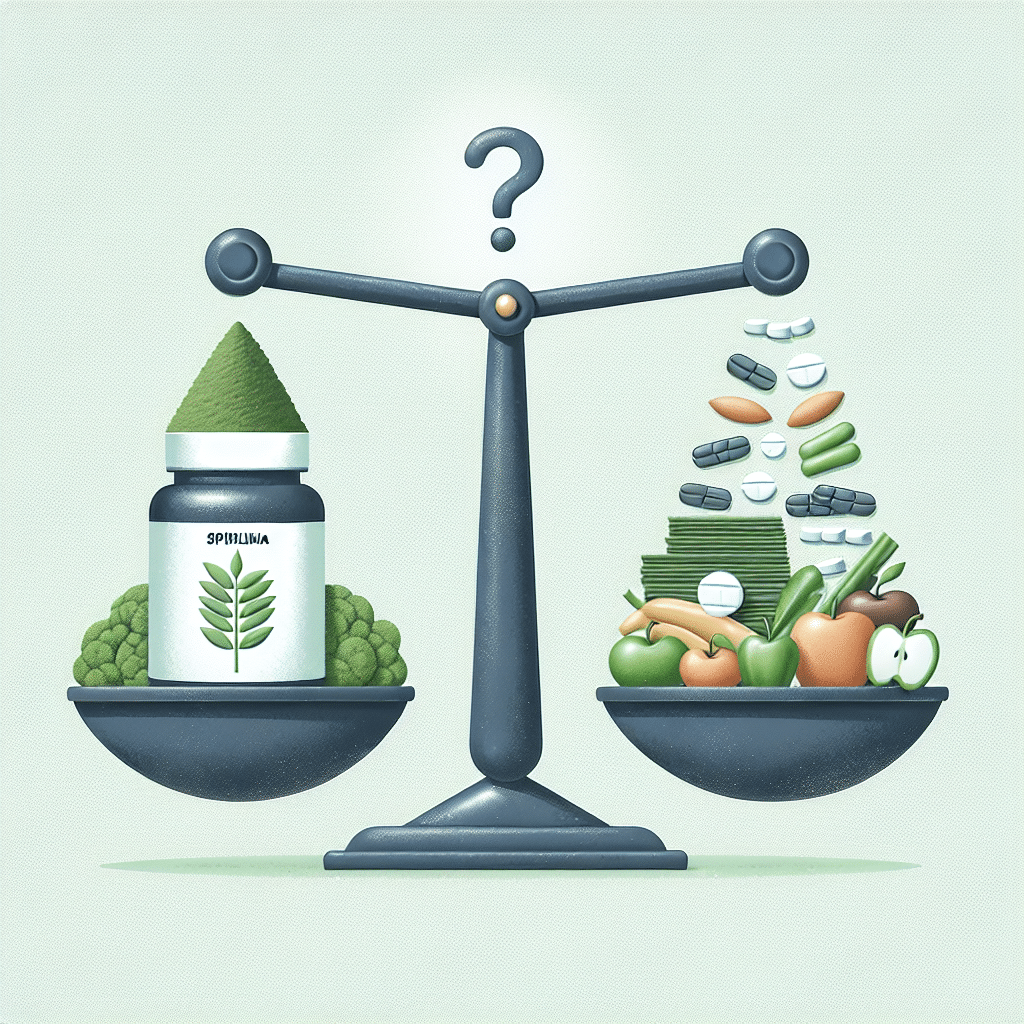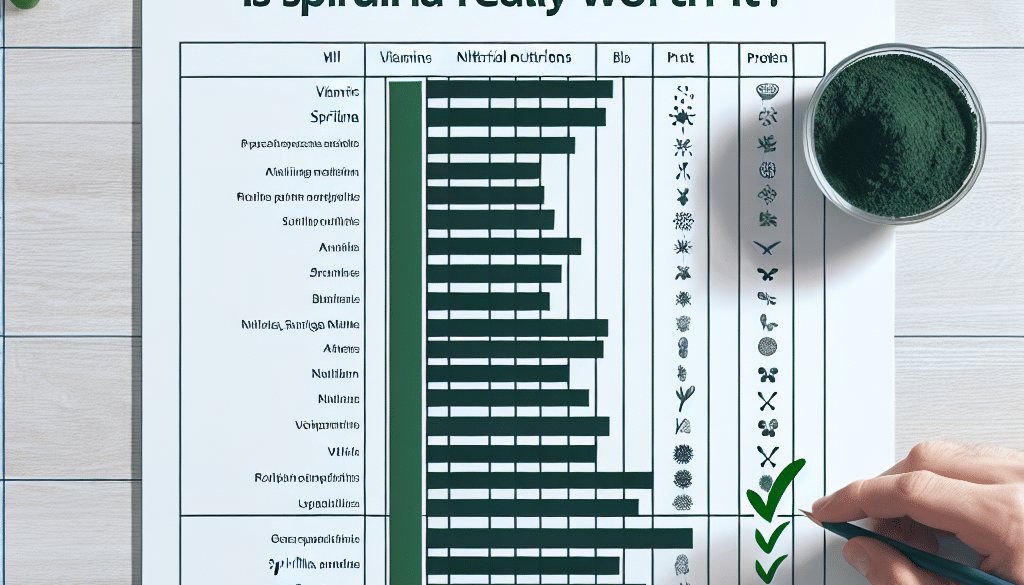Is Spirulina Really Worth It? Deep dive
Table of Contents
- Spirulina: Unveiling the Truth Behind Its Health Hype
- What is Spirulina?
- Nutritional Breakdown of Spirulina
- Health Benefits of Spirulina
- Boosts Nutrient Intake
- Supports Immune Function
- May Improve Gut Health
- Potential Anti-Cancer Properties
- Cardiovascular Health
- Debunking Spirulina Myths
- Myth: Spirulina Can Replace a Balanced Diet
- Myth: All Spirulina Supplements Are Equal
- Myth: Spirulina Has No Side Effects
- Case Studies and Statistics
- Case Study: Spirulina Supplementation in Undernourished Children
- Statistical Data: Spirulina’s Growth in the Health Market
- Is Spirulina Worth It?
- Conclusion: Spirulina’s Place in Your Diet
- Discover ETprotein’s High-Quality Protein Products
Spirulina: Unveiling the Truth Behind Its Health Hype

Spirulina, a blue-green algae, has been touted as a superfood with a remarkable nutrient profile. Its popularity has surged in recent years, with health enthusiasts and researchers alike delving into its potential benefits. But is spirulina truly the panacea it’s made out to be, or is it just another health trend that will fade away? This article aims to dissect the facts and myths surrounding spirulina, providing a comprehensive look at whether it’s worth incorporating into your diet.
What is Spirulina?
Spirulina is a type of cyanobacteria, often referred to as blue-green algae, that grows in both fresh and saltwater. It has been consumed for centuries, with historical evidence suggesting its use by the Aztecs and other Mesoamerican cultures. Today, spirulina is cultivated worldwide and is available in various forms, including powders, tablets, and capsules.
Nutritional Breakdown of Spirulina
One of the primary reasons for spirulina’s acclaim is its dense nutritional content. Here’s what a typical serving of spirulina (about two tablespoons) offers:
- Protein: Spirulina is composed of up to 70% protein by weight and contains all essential amino acids, making it a complete protein source.
- Vitamins: It is rich in B vitamins, particularly vitamin B12, which is often lacking in vegetarian and vegan diets.
- Minerals: Spirulina contains a range of minerals, including iron, magnesium, potassium, and calcium.
- Antioxidants: The algae is a source of antioxidants like phycocyanin, which may have anti-inflammatory properties.
- Essential Fatty Acids: Spirulina includes gamma-linolenic acid (GLA), an omega-6 fatty acid with potential health benefits.
Health Benefits of Spirulina
Research has linked spirulina to several health benefits, which we will explore in detail.
Boosts Nutrient Intake
For those with nutrient deficiencies or individuals following restrictive diets, spirulina can be an excellent supplement to boost intake of proteins, vitamins, and minerals.
Supports Immune Function
Studies suggest that spirulina can enhance immune function, possibly due to its high antioxidant content and its ability to modulate immune responses.
May Improve Gut Health
Emerging research indicates that spirulina can promote gut health by fostering the growth of beneficial intestinal bacteria and inhibiting harmful ones.
Potential Anti-Cancer Properties
Some laboratory and animal studies have shown that spirulina may have anti-cancer properties, although more research is needed to confirm these effects in humans.
Cardiovascular Health
Spirulina may help lower cholesterol levels and blood pressure, reducing the risk of cardiovascular disease.
Debunking Spirulina Myths
Despite its benefits, there are several myths about spirulina that need to be addressed.
Myth: Spirulina Can Replace a Balanced Diet
While spirulina is nutrient-rich, it should not be considered a replacement for a varied and balanced diet.
Myth: All Spirulina Supplements Are Equal
The quality of spirulina supplements can vary greatly depending on the source and production methods. Contaminated spirulina can contain harmful substances like heavy metals.
Myth: Spirulina Has No Side Effects
Some individuals may experience side effects from spirulina, especially if they have certain allergies or medical conditions.
Case Studies and Statistics
Let’s look at some real-world examples and statistics that highlight spirulina’s impact on health.
Case Study: Spirulina Supplementation in Undernourished Children
A study conducted in Central Africa found that undernourished children who were given spirulina supplements showed significant improvements in weight gain and nutritional status.
Statistical Data: Spirulina’s Growth in the Health Market
The global spirulina market size was valued at USD 346.6 million in 2019 and is expected to grow, indicating its increasing popularity as a dietary supplement.
Is Spirulina Worth It?
Considering the evidence, spirulina can be a valuable addition to one’s diet, especially for those looking to increase their nutrient intake or seeking plant-based protein sources. However, it’s essential to approach spirulina as a supplement rather than a cure-all and to ensure that it comes from a reputable source to avoid contaminants.
Conclusion: Spirulina’s Place in Your Diet
In conclusion, spirulina has a place in the health and wellness sphere, with its rich nutrient profile and potential health benefits. While it’s not a magic bullet for health, it can complement a balanced diet and support overall well-being when used appropriately.
Discover ETprotein’s High-Quality Protein Products
If you’re looking to incorporate high-quality protein into your diet, consider ETprotein’s range of organic bulk vegan proteins. Their products, including spirulina, are characterized by a neutral taste, non-GMO, allergen-free attributes, and are suitable for various industries.
About ETprotein:
ETprotein, a reputable protein and L-(+)-Ergothioneine (EGT) Chinese factory manufacturer and supplier, is renowned for producing, stocking, exporting, and delivering the highest quality organic bulk vegan proteins and L-(+)-Ergothioneine. They include Organic rice protein, clear rice protein, pea protein, clear pea protein, watermelon seed protein, pumpkin seed protein, sunflower seed protein, mung bean protein, peanut protein, and L-(+)-Ergothioneine EGT Pharmaceutical grade, L-(+)-Ergothioneine EGT food grade, L-(+)-Ergothioneine EGT cosmetic grade, L-(+)-Ergothioneine EGT reference grade and L-(+)-Ergothioneine EGT standard. Their offerings, characterized by a neutral taste, non-GMO, allergen-free attributes, with L-(+)-Ergothioneine purity over 98%, 99%, cater to a diverse range of industries. They serve nutraceutical, pharmaceutical, cosmeceutical, veterinary, as well as food and beverage finished product distributors, traders, and manufacturers across Europe, USA, Canada, Australia, Thailand, Japan, Korea, Brazil, and Chile, among others.
ETprotein specialization includes exporting and delivering tailor-made protein powder and finished nutritional supplements. Their extensive product range covers sectors like Food and Beverage, Sports Nutrition, Weight Management, Dietary Supplements, Health and Wellness Products, and Infant Formula, ensuring comprehensive solutions to meet all your protein needs.
As a trusted company by leading global food and beverage brands and Fortune 500 companies, ETprotein reinforces China’s reputation in the global arena. For more information or to sample their products, please contact them and email sales(at)ETprotein.com today.












